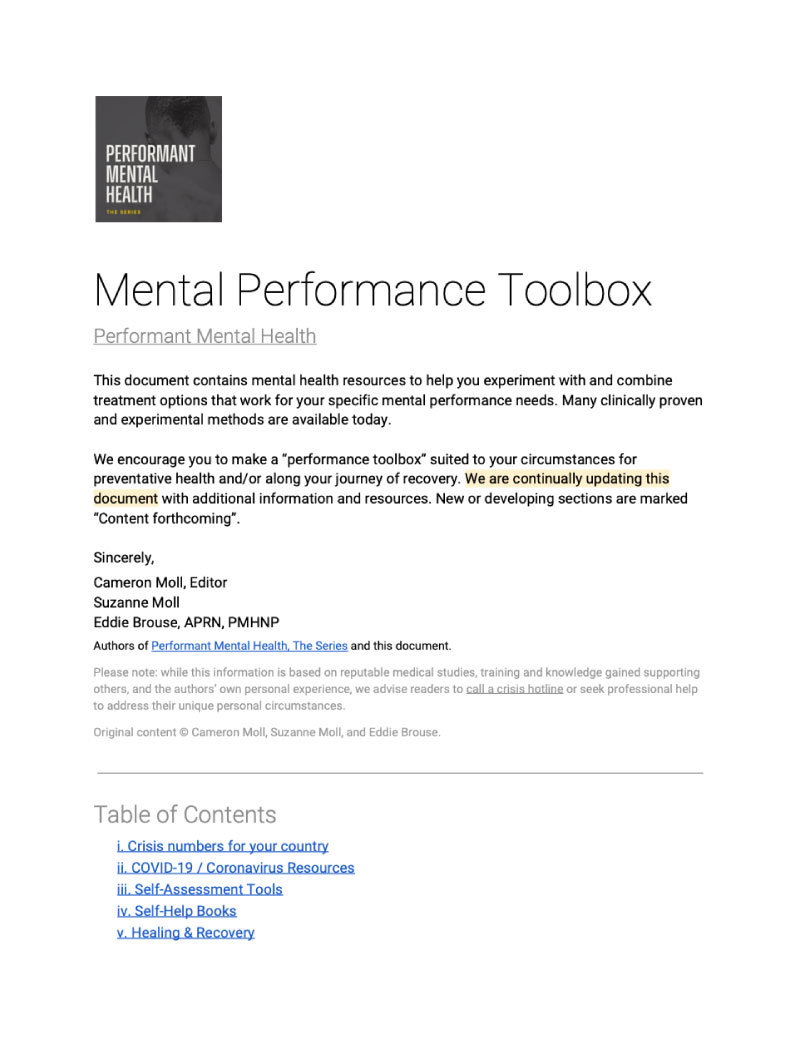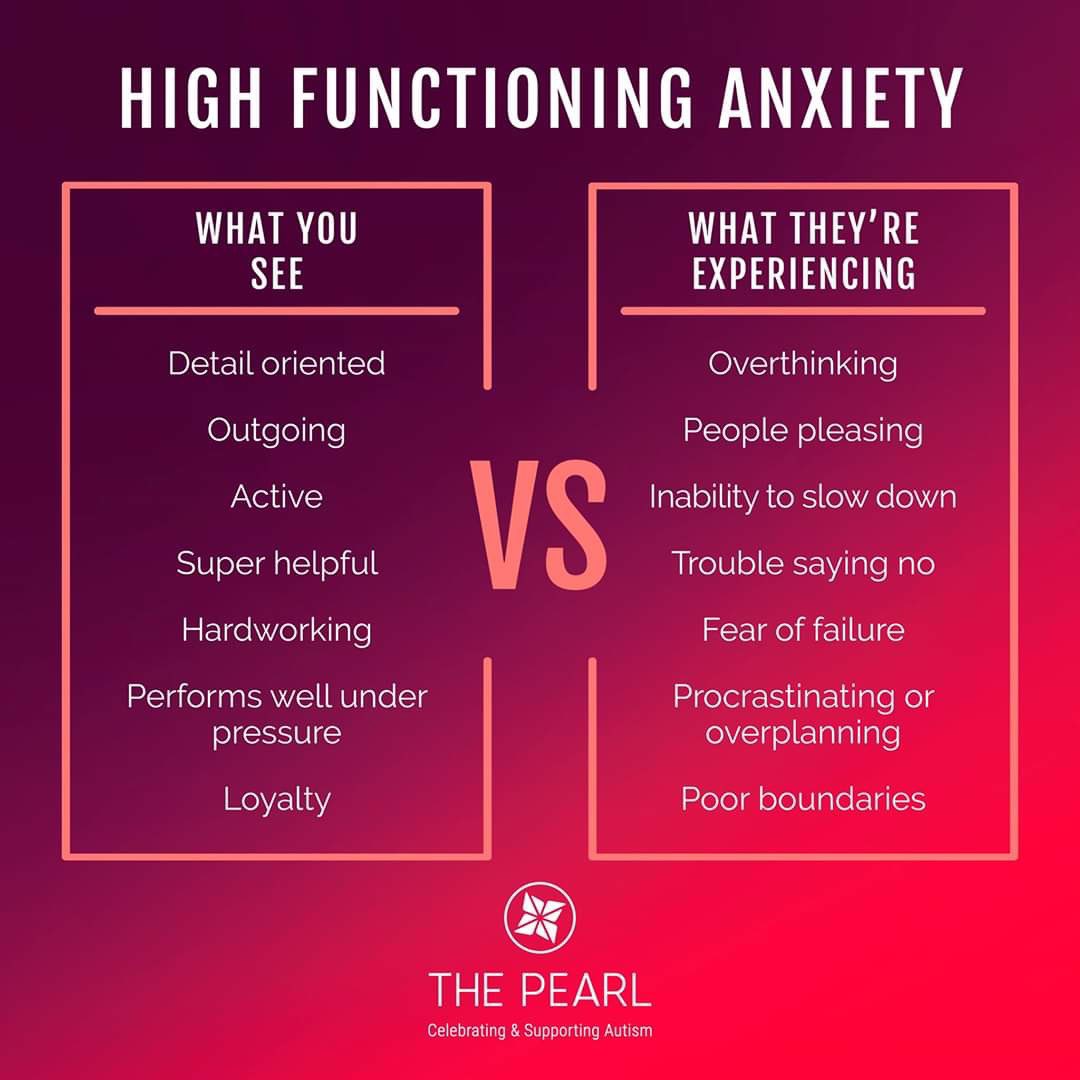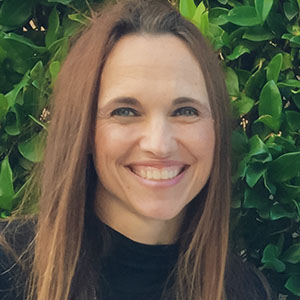Editor’s note: COVID-19 was hardly on the map when we began writing this series. Today the Coronavirus is top of mind for nearly everyone. While this series isn’t focused on COVID-19 exclusively, we feel it’s important to provide resources to help you care for your mental health during this global pandemic. Here are just a few.
- Coronavirus Anxiety - Helpful Expert Tips and Resources – Massive list of resources continually updated by the Anxiety and Depression Association of America.
- How to Be Together Apart In the Time of Coronavirus – “In this time of increasing social isolation, gathering to stave off loneliness will be one of the most important forms of virtual gathering. Meaning and connection are easier to create, particularly virtually, through specificity and structure” (The New York Times).
- If Coronavirus scares you, read this to take control over your health anxiety – “Try not to seek constant reassurance. Seeking reassurance can make you feel calmer for a little while, but in my experience, it is always temporary. Your brain creates a feedback cycle where you become increasingly reliant on reassurance, which only serves to reinforce the anxiety” (The Guardian).
- Many more resources can be found in this shared Google document, “Mental Performance Toolbox”. We hope you and your loved ones are safe and well under the circumstances.
As mentioned in the first article, this series focuses primarily on two of the most common types of mental illness globally: anxiety and depression. We’re confident the resources provided in this article will be applicable to other mental health issues, too.
Recognizing the adverse symptoms of mental health
Spoiler alert: you can assess your mental health right now using a myriad of online self-assessment tools. There are lots (really).
- For anxiety – we recommend Psychology Today’s Anxiety Self-Assessment or Psycom’s Anxiety Self-Assessment. The first is more extensive than the second, but both provide helpful results.
- For depression – we recommend Kaiser Health’s Depression Self-Assessment. It’s straightforward and the results are clearly communicated.

However, please note:
-
Self-assessment tools are not a replacement for professional help. Only a qualified medical professional such as a psychiatrist or psychologist (what’s the difference?) can accurately diagnose your condition and help you begin a formal treatment plan.
-
We’re in the midst of COVID-19, a global pandemic. Symptoms of anxiety and depression are likely to be elevated for many people. This doesn’t negate the validity of your assessment. On the contrary, we believe there’s no better time than now to evaluate your mental health. We suggest you self-check again in 2–3 weeks to track your progress.
Because medical technology doesn’t allow us (yet) to pinpoint mental illness with the same accuracy as physical illnesses such as a fever as a signal of the flu, self-assessment tools and assessments done by a professional rely on telltale symptoms of depression and/or anxiety that have been indexed over several decades. These symptoms are identified based on honest answers to questions such as these:
- Do I have difficulty feeling joy?
- Is it difficult to remember the last time I had a happy day or even moment?
- Do I feel a lack of energy?
- Have I experienced a change in appetite?
- Is it hard to get out of bed?
- Do I have ups and downs regularly?
- Do I have difficulty sleeping?
- Am I using medications, alcohol, or other substances to try to control my feelings?
- Do I have thoughts of suicide or self-harm?
- Do I have panic attacks?
- Does my fear or anxiety make it hard to focus on work, school, or home life?
- Am I easily annoyed?
Depending on how frequently you’ve experienced each of these symptoms, an assessment is given which rates your anxiety or depression on a scale of ‘none’ to ‘severe’. A period of at least two weeks is needed to make an informed assessment. Answers to some questions, such as thoughts of suicide, may signal red flags that should be addressed immediately (crisis hotline numbers for your country).
Once again, with decades of research and experience under their belt, the psychiatric field is your best shot—and the only medically recognized option—for accurately diagnosing your mental state. Self-assessment tools, however, can be a great place to start.1
Honesty is key
This is a tough one. Many of us are quick to utter I’m fine or that’s not me, yet slow to admit I need help or yes I’ve considered suicide. Please heed our advice: the longer you delay honestly assessing your mental health, the more problems you potentially create for yourself.2
One of us, your humble authors, struggled to overcome depression-related sleep issues on their own for nearly a year before finally seeking medical help and starting a medication regimen.3 The consequences in other areas of this person’s life due to a lack of sleep were significant, though not irreversible.
“Most of us can recognize when a cut is deep enough to require stitches,” contends Guy Winch, PhD, author of Emotional First Aid. “But when it comes to our psychological wounds, we lack not only the wherewithal to do anything about them but also the ability to identify when they require professional intervention.”
Please don’t wait a year to assess your psychological wounds and allow for professional intervention! Be willing to accept that you may be experiencing symptoms of depression or anxiety right now.
You’re not alone. We’ve been there (and are still there in some regards) as have many, many others. There is hope ahead. There are many treatment options available to you whatever your comfort level with therapy, medication, and self-help.
Speaking of options…
Your personal “mental performance toolbox”
*cracks knuckles, stretches neck muscles* Let’s talk shop. Imagine a workshop chock full of the best tools in the industry. Whatever the project or repair, you’ve got a tool on hand for that. Sliding miter saw? Check. Digital torque adapter? Done.
This is what’s at your disposal today in mental performance terms. There’s a veritable mental health “workshop” full of the best treatment tools that science, medicine, nature, the wellness industry, and religion have to offer. The privilege is yours to assemble a toolbox that addresses your situation, your way, along with the help of medical professionals, mentors, family, and friends.
Awareness Anchor #4
Experiment with and combine treatment options that work for your specific needs. Many clinically proven and experimental methods are available today. Make a “performance toolbox” that you can draw from.
Be creative! Don’t just settle on one treatment or the first treatment. Most medical professionals agree a combination of treatments are the most effective path to sustained recovery.
“The process of recovery is highly personal and occurs via many pathways,” write the editors of Mental Health Disorders Sourcebook (MHDS), Sixth Edition. “A person’s recovery is built on his or her strengths, talents, coping abilities, resources, and inherent values. It is holistic, addresses the whole person and their community, and is supported by peers, friends, and family members.”
And while you may feel completely disempowered by the suffocating effects of anxiety and depression, knowledge can be incredibly empowering. Knowledge from an accurate assessment of your mental health. Knowledge about the tools available to prevent, course-correct, and thrive. Knowledge that you’re not alone in the fight to recover.
We couldn’t possibly tell you what to put in your toolbox. That’s beyond the scope and purpose of this series. We can, however, provide you with knowledge of what’s available. Give you a tour of the workshop, if you will.
Consider this your tour of the workshop: Mental Performance Toolbox, a shared Google doc that contains numerous categories, resources, and links for many of the treatment methods available today. We will update it with additional information and resources.

The critic in your head: combating negative self-talk
Why is loving ourselves so hard to do? Parental neglect or abuse, low self-esteem, criticism from others, high expectations within one’s environment, feeling unloved based on previous experiences, a malfunction of neurotransmitters, disastrous mistakes, peer comparison, caring too much about how others view you… the reasons are endless.
Understanding the ‘why’ of self-criticism is a very personal, complex matter. It’s even more complex when you’re experiencing severe mental health issues.
Despite your best efforts, you may not be able to control your thoughts due to an imbalance or malfunction in your physical well-being. Further, when mental performance is impaired, your actions may exacerbate issues/stimuli in your environment that encourage self-deprecative thinking. If this thinking continues uncontrollably or for an extended period, eventually you believe you’re worthless. This is a critical indication of needing help. (Here are those crisis numbers again.)
Allow us to revisit anchor #2 for this series: You’re doing more things right than you realize. Much of what you’re experiencing may not be your fault. Check again the reasons we rattled off at the start of this section. How many of those are truly your fault? Probably very few.4
“As long as you are breathing,” writes Jon Kabat-Zinn in Full Catastrophe Living,“there is more right with you than there is wrong, no matter how ill or how hopeless you may feel.”
Awareness Anchor #2
You’re doing more things right than you realize. Much of what you’re experiencing may not be your fault.
We’re not here to convince you of the inestimable worth of every human being especially you, although we desperately wish we could. And we couldn’t possibly account for all the ways you might combat negative thoughts tailored to your situation.5 After all that’s what professional help is for.
But what we can do is provide a few principles we’ve found to be successful for developing greater self-compassion. Here they are in no particular order.
1) Grant yourself the same compassion you offer others.
You deserve to offer yourself more compassion, forgiveness, and understanding than anyone else you could offer these things to. Think of it as an inflection of the Golden Rule: “Do unto yourself as you would have others do unto you.” Or perhaps, the Palladium Rule. (Palladium is currently valued above gold on the Precious Metals Index.)
Imagine verbalizing some of the things you tell yourself. You’re so stupid or that was terrible or why can’t you ever do anything right? Chances are you would never utter these things do someone you care about. Give yourself the same privilege of compassionate speaking.
2) Stop. Comparing.
“Comparison is the thief of joy.” Attributed to Teddy Roosevelt, this observation couldn’t be more accurate in our humble opinion. In fact, comparison is a multifaceted shoplifter: thief of confidence, thief of perspective, thief of sound logic, and so much more.
Awareness Anchor #5
Dare not to compare. Your circumstances and recovery plan are unique to you.
Here we invoke anchor #5: Dare not to compare. Your circumstances and recovery plan are unique to you. Lean in to your strengths. Stay focused on what matters most to you and your loved ones. Set feasible goals and realistic expectations for yourself. Unfollow those you envy on social media. Acknowledge your unique circumstances but don’t allow them to become a societal measuring stick.
“The joy we feel,” observes Russell M. Nelson, an eccesiastical leader who has amassed more than nine decades of life experience, “has little to do with the circumstances of our lives and everything to do with the focus of our lives.”6 Focus on your joy, not that of others.
3) Focus on what you can control.
This mantra has been espoused repeatedly by our good friend, Justin Su’a, performance psychology coach for the Tampa Rays major league baseball team.
Justin knows a thing or two about mental performance at the highest levels: prior to the Tampa Rays he was the performance psychology coach for the Boston Red Sox when they won the World Series in 2018.7
Focus on what you can control.
— Justin Su’a (@Justinsua) November 1, 2019
Focusing on what you can control empowers you to free your mind of the self-destructive rumination that is rooted in things beyond your control. We totally get it—casting aside worry or letting go of hurtful experiences, whether present or past, is much easier said than done. But we firmly believe that choosing what to focus on is within your grasp.
“Be that person who can look at the bright side of a difficult situation and keep tough times in perspective,” Justin tweeted as concerns about COVID-19 were heightening across the globe. “This doesn’t mean to be unrealistic or naïve, it means to [be] able to stare adversity in the face and then focus on what you can control.”
Satya Nadella, CEO at Microsoft, shared a similar perspective in a recent email sent to Microsoft employees: “One truth that brings me comfort is just as this virus has no borders, its cure will have no borders. We are all in this together as a global community. For me, the best way I’ve found to get past this anxiety is to focus on what I can do each day to make a small difference. Each of us, wherever we are, has the opportunity to do the same—take an action driven by hope, a small step that makes things a bit better.”
You might find it difficult to relate to a World Series assistant coach or the CEO of a global Fortune 100 company, but no one is immune to life’s setbacks (including mental ones). We can attest Justin’s personal challenges aren’t unlike yours and ours, and you might be surprised to learn Satya Nadella cares for a son who is quadriplegic, legally blind, and has cerebral palsy.8
4) Recognize when you’re catastrophizing.
“Catastrophizing” is usually defined as imagining the worst possible outcome (or catastrophy) of a current or future situation. As one’s mental health deteriorates, so does one’s ability to forecast rational, positive outcomes.
Simply put, catastrophizing is highly destructive and incredibly unproductive. It amplifies and incites negative feelings about your self-worth and toward the stimuli in your environment. It inhibits your ability to interpret rationally your present conditions as well as future ones.
“Falling prey to catastrophizing is like striking out in your mind before you even get to the plate,” writes John M. Grohol, Psy.D. “The first step to dealing with catastrophizing is to recognize when you’re doing it. The sooner you start tracking this, the quicker you’ll be able to start focusing on stopping it.”
Begin now to develop a heightened awareness of catastrophizing. Grohol shares somes helpful advice for doing this in his article, “What is Catastrophizing?”
5) Do a 24-hour “mental fast” from negative thinking.
You may not feel empowered to control negative thoughts indefinitely, but could you do it for just one day?
Fasting, the act of abstaining from food and/or drink for a period of time, is a centuries-old practice common to many cultures and religions. It has many potential health benefits (including brain health!) and can act as a temporary reset for your body.
You can do the same for your mind. Give yourself a cognitive reset by doing a “mental fast”. Set aside one day this week to abstain from negative thoughts, negative speaking, and self-deprecation. Start and end your fast at specific times. You don’t even need to eliminate the thought entirely—just tell it to go away for 24 hours.
Then, evaluate at the end of 24 hours. What did you learn? How did you feel? Could you do it again? You might surprise yourself.
6) Accept that it’s perfectly okay to use “I statements”.
Many of those suffering from anxiety and depression are caught in the trap of trying to please everyone around them. Their limits and emotions take a back seat to the perceived needs of others. Yes, selflessness is critical to maintaining benevolence in society. But too much of it can lead to disempowerment of self, not to mention increased anxiety.

I statements empower you to regain control of your environment and reduce some of your anxiety. They allow you to recognize your feelings are separate from the feelings of others. This creates a greater sense of identity. It also allows responsibility to be placed with whom it belongs.9
I statements give you the opportunity to express how you feel. “I do not like that…” or “I am angry when…” Using an I statement in connection to a specific situation further identifies your needs. Once you state your needs, consider the response of the other individual. For example, when you say “I can’t go with you because that isn’t what is best for me” you’re providing an opportunity for those around you to identify their intent. Someone who tries to persuade you otherwise clearly is not interested in what is best for you. And that is okay—don’t get hung up on this. Other people have their own needs driving their own emotions.
What’s important is to recognize the difference between their needs/wants and yours. Once you state your reasons for how you feel and what you need, then you’re no longer to blame. Let other people be in charge of their own feelings and how they choose to respond. I statements clarify and empower you to focus on you.
7) Prioritize rather than balance.
Trying to “balance” everything is self-defeating—none of us can do it. No really, none of us can do it. And we get down on ourselves when we fall short or drop balls.
Focus on prioritizing instead. Cameron wrote about this in a post on Facebook and we repeat some of it here:
- Focus on long-term priorities knowing that in the short term things may feel unbalanced or that lower priorities need to take the top spot temporarily.
- There are two ways to interpret “balance”: (a) equilibrium ie. every component is given equal weight, (b) harmony similar to how a natural ecosystem may have vastly different components and even destructive forces, yet everything exists in a unified state. This latter approach is usually more conducive to self-compassion and self-forgiveness.
- Work/life vs. life/work prioritization will vary at different life stages. “When I was starting my career and our kids were toddlers, I was very much focused on getting ahead and putting food on the table as the sole provider for a large family,” Cameron writes. “At this stage of my life, I care less about my career and much more about serving others, helping my sons become virtuous, contributing men of society, and so on.”
Karissa Neely’s comment on Cameron’s post is also worth reading.
A proper understanding of recovery
We plead with you (and all those who support you) to reframe your perspective of “recovery” from mental illness. In most cases recovery does not mean 100% restoration to who you were formerly, but rather a new version of you that’s just as valuable as the previous version—even more valuable if you consider the profound empathy, understanding, and grit you now possess.
We support how the MHDS defines recovery: “continual growth and improvement in one’s health and wellness that may involve setbacks. Because setbacks are a natural part of life, resilience becomes a key component of recovery.”10
In short, recovery = improvement + setbacks managed with resilience.
It may sound trite, but recovery is best viewed as a journey rather than destination. Along that journey you’ll experience positive and negative emotions, thoughts, and feelings. Not only is this normal but completely healthy, too.
“Simply put, people who are able to use the whole range of their natural psychological gifts—those folks who are comfortable with being both positive and negative, and can therefore draw from the full range of human emotions—are the healthiest and often, the most successful,” contend authors Todd Kashdan and Robert Biswas-Diener. “Wouldn’t it be great to possess full access to the endless energies of creation instead of shackling ourselves to just being positive, cheerful, kind, loving, and selfless?”11
Communication is essential to recovery. As you work toward improved mental performance and resilience, you must learn to communicate or you’ll rebound back to an unhealthy place.
There are four fundamental elements of communication: (1) sender, (2) message, (3) mode of communication, and (4) receiver.
Each of these are important in your recovery journey. The problem, however, is most of us view communication as a linear path rather than a reciprocal one. Communication is not complete until the sender confirms that the receiver understands. This little caveat is one of the most neglected advancements of the civilized world, to put it bluntly. Please keep this in mind as you share with others—loved ones, friends, medical professionals—where you are at on your journey.12
Finally, hope. Hope is absolutely vital. Hope is “the foundation of recovery.”13 We have great hope for you. And for those that support you. We’ll address them in the next article.
We also offer virtual training for your team on understanding mental health and improving mental performance at work. Please contact us to schedule.



